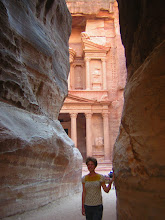The day in Indonesia is divided into four parts: pagi or morning, siang, or mid-afternoon, sore, or late afternoon, and malam, or night. It may seem strange, to anyone unfamiliar with the tropics, to make such distinctions, but once you've been here you see the necessity. Morning is like morning everywhere, with day dawns breaking left and right, and the city beginning to stir around six a.m. Much as I complain, I like this time of day: with the sun not yet fully up, the air is still relatively cool, cool enough for the old Chinese man down the street to sit outside on his wicker chair, sarong hiked to his knees, and slowly, with dignity, nod his head at everyone who passes, and the hordes of freshly-bathed schoolchildren in freshly-ironed uniforms--red for elementary school, blue for middle school, and grey for high school--add an energy to the start of the day, an eager brightness that is gone a few hours later, as pressed clothes and spirits begin to droop in the tropical heat.
The heat really hits around ten, the time siang begins--this, then, is the "mad dogs and Englishmen" phase of the day, when everyone, meaning, mostly, me, is sluggish and sweaty and sleepy, wanting only to go home and nap under a fan. The less said about siang in this hot city, the better.
Sore is my absolute favorite, lasting from three-ish to sunset at six, which seems like a confusing and arbitrary chunk of time to the Western mind, at least until said mind experiences it, and then it's obvious and natural--of course those hours are different. Sore is bookended by calls to prayer, and something changes in the air during the three o'clock call, some slight shift in the temperature and the light which makes everyone start greeting each other with selamat sore instead of selamat siang, and which brings the old Chinese man out again, ready to greet the neighbors as they head home. Sore is cool again, almost cool enough to be pleasant, and as the sky darkens the bats come out, swooping low overhead, and, if you live in a neighborhood like mine, the muezzin keeps up a steady stream of goodness-knows-what from the mosque's loudspeakers, filling those hours between the calls with preaching and reading from the Qur'an and, as far as I can tell, trying to clear his throat. (I know Arabic sounds kind of like coughing, but, really, not that much.) Some people find the noise of the calls distracting and invasive, but I love it: the sound of Allahu akbar! echoing through the city stirs something in me, something deeply spiritual that I can't quite describe, and not even the fact that my local muezzin sounds exactly like Tom Waits can destroy the feeling.
For all this extended-evening period, night comes on fast. By the time the sunset prayer has ended, sunset, too, has ended; the night is as dark at six p.m. as at eleven p.m. It's rather disconcerting, this sudden sunset, like someone turned off a lamp; I find myself, every so often, going into a building just before six and coming out, a few minutes later, to wonder if, perhaps, my clock is broken and I spent more time inside than I thought. Malam is relaxed and quiet: by nine p.m., if not earlier, everyone is at home, watching T.V. or just hanging around on their porches, chatting peaceably, swatting mosquitoes, and waiting for bedtime and therefore the next morning. Early to bed and early to rise, they say; they must have been Indonesians.
I won't miss this emphasis on pagi-pagi, early morning, over malam-malam, late at night, but I've grown used to, and fond of, these four-part days. More especially, I'll miss sore, the bustle and the bats and the breeze, the projected invitations to come to prayer, to come to success. I'll never again, alas, settle for a simple English "evening."
Tuesday, May 15, 2007
Subscribe to:
Post Comments (Atom)

3 comments:
OK, so now I'm homesick.
It's interesting to see that four-part day reflected all over the tropics: it's the same here (though the times are a bit different--sunset here is 5:30 PM, and sunrise is about 5:00 AM), and it was the same on my mission. On my mission, they used the regular three-part day terms for manhã, tarde, and noite--but the nice, cool, second part of the tarde was called the tardinha (made all cute with its diminuitive--hey there, little tarde).
I haven't yet found a Mozambican Tom Waits, though. You beat me there.
It has been a while since I found my way to your blog but I am glad that I did; this post is particularly beautiful.
Post a Comment